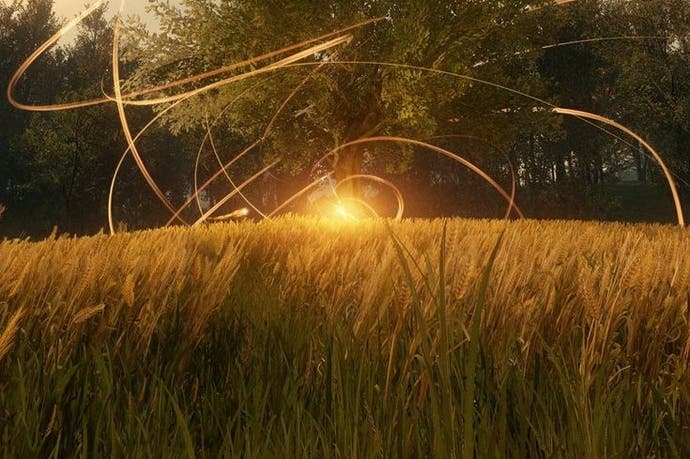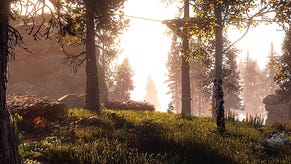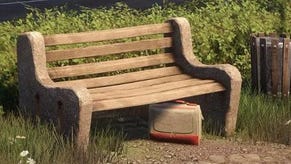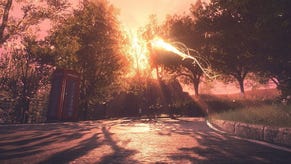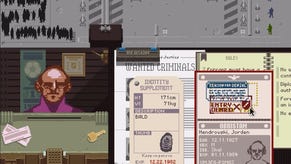Everybody's Gone to the Rapture review
Lights out.
One of the most dexterous words in English literature is things. Being flexible and useful is the entire point of a word like things, of course, but still: watch it sing in a book like I Capture the Castle or Cold Comfort Farm. Shall I clear away the tea things? That, I would argue, is the Early 20th Century English Novel Sentence par excellence. I didn't even look it up: I'm just assuming that Dodie Smith and Stella Gibbons will have both landed on it through sheer cultural resonance. How could they not? There will be tea so there will be tea things, and it's only polite to ask when you're thinking about getting rid of them, isn't it? And look what the word things is doing in that sentence! It is creating a friendly out-of-focus clutter of everyday objects, a nimbus of impedimenta. It is suggesting that even the most mindless of routines like serving a pot of Earl Grey will have a quiet exactitude to it, often requiring the use of tools. Life is ritual. Brew up.
Everybody's Gone to the Rapture, the latest narrative ramble from The Chinese Room (and Sony's Santa Monica Studios) does not quite belong to this English tradition, but slots comfortably into another - the tradition of Wyndham and Quatermass, where things is apt to take on prickly aspects of the uncanny. What do you think those things were? What could those things want? No matter. In its sumptuous and evocative treatment of a very English apocalypse, Rapture has plenty of room for the original things of Smith and Gibbons as well: for the chummy muddle of life and its many attendant bits and pieces that is so much a part of Middle England's conception of itself that it survives even when most of humanity has been swept away.
And it spoils nothing, hopefully, to say that this is the big theme of Rapture: what remains when we are gone? What were we about, and what was the point of the time we had? Can we hope to be more than the things we gathered around us when we lived? To examine these vital questions, The Chinese Room offers up an entire village, breezy and blooming and delivered in gorgeous brackeny fidelity by CryEngine tech, and then it empties it of people - superficially at least. This is post-event territory, and the event must have been awful. Where is Everybody? They've gone to the Rapture. Let's wander around and try to decide what that means exactly.
The CryEngine is a consistent delight, as capable handling Laura Ashley as it is with the NanoSuit from Crysis, effortlessly allowing for several distinct kinds of scuffed paint, the warp of an old wooden table, the dancing glint of alien lights. Rapture is so pretty and so detailed - and it really needs to be, in order to work its peculiar spell - that for the first few minutes I was overwhelmed. The things that got to me weren't characters or events, although that stuff would come, and devastatingly so. The things that got to me were, well, things.
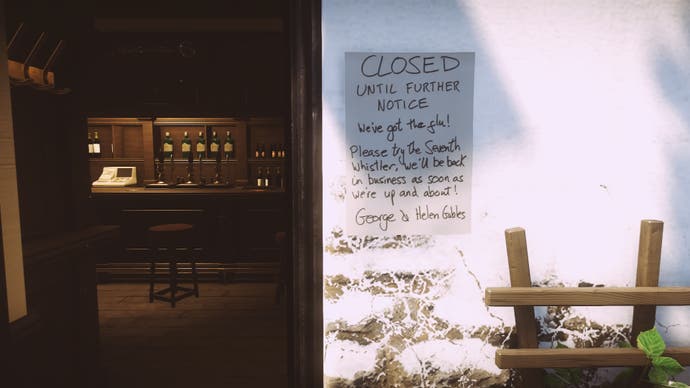
The great surprise of the first two minutes, for example, came when, upon finding myself at the top of a hill, in front of the locked gates of an observatory, I ventured into a side building to discover an old Commodore computer plugged into a telly and informing me that Rapture is set in the 1980s rather than 1950s as I had initially imagined. (You could at least argue that in Britain, the 1980s felt closer to the 1950s than they did to the 1990s anyway.) And that Commodore had accomplices: 30 minutes later I had a genuinely queasy shock of recognition and fear, not delivered via a plot twist or an incisive line of dialogue, but from the exploration of an old house that revealed - oh God, no - an avocado bathroom suite lurking upstairs.
Exploration and dialogue: like Dear Esther, this is another game about moving around a space and piecing together a story from the fragments of narrative you trigger as you go. Unlike Dear Esther, however, it feels considerably less passive, and less of a strange hybrid installation piece. Superficially, this may be because there are now plenty of objects you can interact with, whether you're turning on radios, answering ringing payphones, or opening gates. Going deeper, though, it's because Information is absolutely everywhere in the large, intricate map that makes up Rapture's village and the surrounding countryside, so it's hard to feel like a passive visitor. Each new house you stumble through, door ajar, linen flapping on the washing line, will contain details to puzzle over and backstory to untangle. Even the pause screen, enlivened by the monotone poetry of a numbers station, seems to be trying to tell you something.
At times, the things that Rapture wants to tell you about are just brilliant. This is a game where the individual moments are as precious as the beats of the unfolding plot and I don't want to take any of that stuff away from you - but I'm compelled to share at least one incident from the first hour of the game that really stuck. After some pleasant trudging through the village high street, dutifully exploring pub gardens and reading notices in the window of a corner shop, I was starting to tire of the emptiness, of paint spilled with no one to clean it up, of cars parked haphazardly with a door or two flung open. I get it: there's been an apocalypse. I climbed a hill to a tidy church, and entered to find a soul in flux, fragmented and anguished and, as I watched, scattering into golden embers. By the pews, little frozen flames appeared like corkscrews, while glowing motes led me back outdoors where it was suddenly dark. This was the dark of sudden night, but it was also somehow the exciting carefully-arranged darkness you get at the cinema or the theatre, and a path was picked out for me in floating pebbles of light. I followed the pebbles through a maze of heather and privet and emerged into a new day and a forest filled with bluebells.
As the game continues to pull these wonderful tricks of staging, the world of things that The Chinese Room has created settles into a more comfortable balance with the game's other elements, giving ground when needed to the human - and the inhuman - drama that's unfolding. Counter to my own expectations, this is not a particularly complex story to follow, but it is told with a wonderful assurance and a disciplined eye. The theme is the complex stuff, which is as it should be. This is an inquest, which means that, beyond finding out what happened, you want to uncover why - and perhaps what it all means.
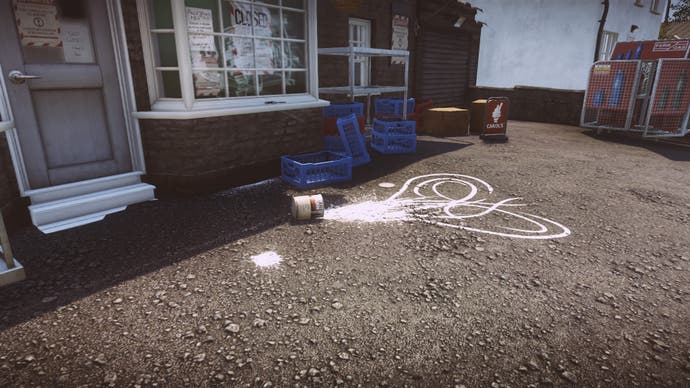
To say that it's the people you meet that makes all this possible seems weird, since Rapture sells its mystery on the absence of people. (It's certainly the absence of people that gives the world its convincing fidelity, an illusion that would be shattered the instant you got a bad bit of lip-synching, a plasticy haircut, or a weightless gesture.) Instead, the people who have departed the village you're exploring have left ghosts of electricity behind them, golden trails, smoothly arcing and yet somehow fidgety, that lead you through much of the game like guides, and who highlight specific areas where something crucial once happened.
Here, you get to dial in to the recording as it were, turning the controller in your hands until tumblers click and a scene plays out, spoken dialogue matched to shadowy forms made of those same warm ribbons of light. The people in Rapture appear like migraines, in other words, or like those images of teeny-tiny particles sometimes captured by nuclear physicists. In their shifting between poses, their willowy, restless intangibility, the game finds a perfect visual match for the story these characters are relating. It's a story told by a handful of distinct voices, and which encourages you to see the central players from different angles over time, from the separate shards that their social personalities have fragmented into.
It should feel dangerous to remove the padding of moment-to-moment busywork, and to lead you so much, but Rapture's narrative works for several reasons, not least of which is the fact that The Chinese Room is already so confident at visual storytelling by the time the game begins that the design can cope with having what amounts to a series of Radio 4 Afternoon Plays clamped onto it. The two elements give against each other a little in interesting ways. Walking round an old lady's house early on in proceedings, I saw a birding book and binoculars sat by a comfy chair and a downstairs window. That was enough. I was primed. I bought into the character even before the acting and the writing - both excellent - sealed the deal.
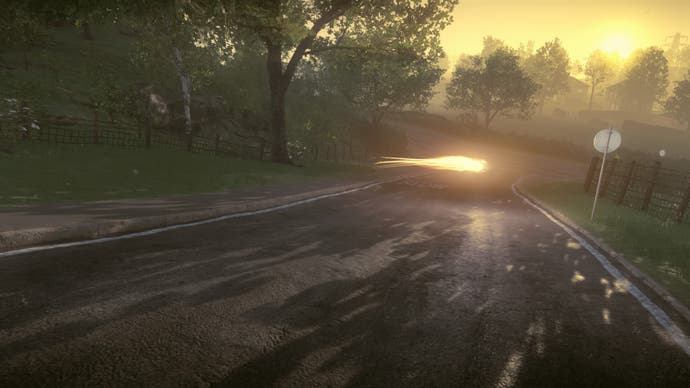
And besides, there are things that even the best dialogue cannot tell us. A tragic telephone conversation overheard in a chintzy sitting room speaks far less eloquently than the game itself can by simply dimming the lights a little: a room that seconds ago was cheery suddenly seems desolate. At these times, the lighting isn't working alone, incidentally. Composer Jessica Curry's soundtrack is a wonder, invoking Vaughan Williams and Vangelis and a million other finely-judged influences in between them, and gluing the whole thing together with the rumbling wind, the buzzing chatter of short-wave radio, the music of the spheres. For all its next-gen prettiness, Rapture is often a game you play with your ears as much as your eyes, in fact, and a lot of the greatest cleverness here is reserved for the world of sound, as birdsong gives way to the tweet of a bulky mobile phone, or as the roar of a waterfall guides you around a blind corner, and confirms that you're headed in the right direction.
All of this, together with brilliantly subtle hand-holding that allows a large map to feel open even as it fragments into corridors, adds up to a really memorable bit of interactive storytelling. You may not do much in the traditional video game sense, but you still feel fiercely engaged, even pivotal. It's not even much of a leap, really. Without the cover and the crouching and the exchanges of gunfire, a lot of games are a bit like Rapture already: they're about working out where to go next and - if you're lucky - teasing out why. Beneath its freshness and invention, Rapture has a surprisingly familiar framework.
In fact, it's near impossible to talk about Rapture for very long without dropping a name - Ethan Carter for its narrative yomping, PT for its creepy domestic fidelity, Her Story for its social archaeology, Year Walk for its fascination with the horror of proximity and of recent absence, The Archers even for its gossipy evocation of the mundane and bucolic - and yet the final result remains entirely singular.
Even when the loose ends have been tidied away, it's hard not to be drawn back to this beautiful village where the cars don't move, where the birds have fallen dead from the trees, and where everybody who was ever anybody is gone. A way of life has drawn to a close, just as it largely did in the real world in places like this, not with the bomb but with the analogue giving way to the digital. It's fitting that one of the final great mysteries here is the player: a camera drifting along, tugged between signposting and your own whims, but also a definite physical presence in the landscape, opening doors and crunching through dry grass, bearing witness to a place that is beyond saving.
